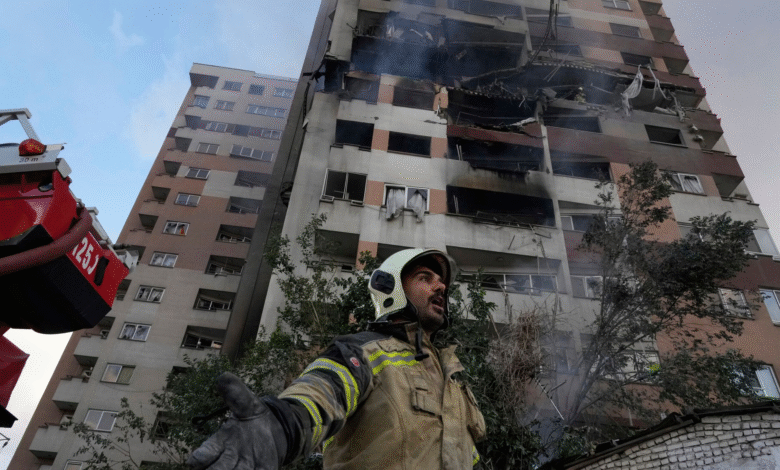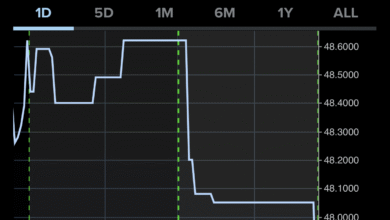Israel Iran Conflict: Gold Prices Surge, Stocks Decline

The Israel Iran conflict has intensified as tensions escalate, drawing global attention and economic repercussions. Recent Israeli airstrikes on Iranian nuclear sites have led to significant geopolitical fallout, influencing markets in real time. In the wake of this military action, gold prices surged by 1.61% per ounce, while crude oil saw a remarkable increase of over 5% per barrel. This volatility contributed to a sharp decline in U.S. stocks, leaving investors bracing for further uncertainties. Additionally, the cryptocurrency market was affected, with Bitcoin dropping as investors reacted to heightened risks tied to the ongoing conflict.
As the geopolitical strife between Israel and Iran unfolds, it is crucial to consider its far-reaching implications on the global economy. This escalation not only raises concerns over military actions but also impacts commodity markets, leading to spikes in gold and oil prices. The fallout is palpable as stock markets react to the instability, with equities witnessing a downturn. Furthermore, the turbulence extends into the digital currency realm, with Bitcoin reflecting the overall sentiment of unease among investors. Understanding these intertwined elements is essential in navigating this tumultuous financial landscape.
Israel-Iran Conflict Intensifies Geopolitical Tensions
The ongoing Israel-Iran conflict has escalated significantly, marked by Israel’s recent airstrikes targeting Iranian nuclear facilities. This military action has exacerbated geopolitical tensions in the Middle East, raising fears of a broader conflict that could disrupt global markets. As investors react to the potential fallout, various asset classes are affected, causing a ripple effect across commodities, stocks, and currencies.
In reaction to the overnight airstrikes, financial markets have shown a swift response, with investor sentiment shifting towards safer assets. This geopolitical turmoil has historically correlated with spikes in gold prices, as traders flock to the ancient safe-haven asset to mitigate risk. Furthermore, increased oil prices reflect fears of supply chain disruptions, illustrating just how intertwined the Israel-Iran conflict is with global economic stability.
Market Reactions: Stocks Plummet as Gold and Oil Prices Surge
The impact of the Israel-Iran conflict on the markets was immediate; major U.S. stock indexes opened lower, with the Dow Jones Industrial Average experiencing a significant decline. The fall in stocks underscores the investors’ nervousness about the geopolitical situation and its potential effects on the economic recovery. As risk appetite fades, assets like gold and crude oil become more attractive due to their historical performance during times of uncertainty.
Gold prices soared to impressive heights, climbing over 1.61% in response to these rising tensions. Meanwhile, oil prices surged past $74 a barrel, signaling a strong reaction to the potential for supply disruptions from Middle Eastern conflicts. This scenario highlights a broader trend where commodity prices, particularly gold and oil, tend to rise during geopolitical crises, while equities are typically the first to feel the brunt of instability.
Cryptocurrency Under Pressure: Bitcoin’s Decline Amid Geopolitical Concerns
Amidst the geopolitical upheaval caused by the Israel-Iran conflict, the cryptocurrency market has not remained unscathed. Bitcoin, often perceived as a risk asset, saw a decline of 1.9% in just 24 hours. This sharp drop illustrates how external factors, like escalating military tensions, can adversely affect digital currencies, which have been gaining mainstream acceptance as an alternative store of value.
Analysts predict that Bitcoin will face increased pressure in the short term as investors reevaluate their portfolios amidst escalating geopolitical concerns. However, there remains optimism for Bitcoin’s long-term prospects, especially if market conditions shift toward risk-on sentiment. The volatility in crypto assets might eventually lead to opportunities for savvy investors once the dust settles from the current geopolitical tensions.
Future Outlook: Economic Implications of the Israel-Iran Conflict
The ongoing conflict between Israel and Iran poses significant challenges not only for regional stability but also for the global economy. Analysts are wary of the potential long-term implications for oil supplies, given that Iran’s ability to disrupt shipping through strategic routes like the Strait of Hormuz could lead to higher global oil prices. This scenario could adversely affect inflation rates worldwide and consequently impact economic growth.
Moreover, the interdependence of global markets means that declines in stock markets due to geopolitical tensions could trigger a broader economic slowdown. Investors are advised to remain vigilant and prepare their portfolios for a diverse range of outcomes, as the shifting landscape could see gold prices continue to rise while stocks may face further corrections.
Investor Strategies During Geopolitical Conflicts: Navigating Turbulence
In times of geopolitical unrest, such as the current Israel-Iran conflict, it is crucial for investors to adopt strategies that mitigate risk. Historically, asset diversification has been a key method for weathering economic storms. By allocating investments across different asset classes—such as gold for safe-haven protection, energy stocks benefiting from rising oil prices, and select cryptocurrencies—investors can better manage potential downturns in equity markets.
Additionally, understanding market sentiment is vital. As geopolitical tensions tend to drive volatility, investors should pay close attention to news updates and market analytics. Being proactive in portfolio management and making informed decisions based on ongoing events can potentially shield investors from steep losses and capitalize on opportunities presented during such crises.
The Role of Gold in Geopolitical Unrest
Gold has long been regarded as a reliable safe-haven asset during periods of geopolitical unrest. The current Israel-Iran conflict has reaffirmed gold’s status, as evidenced by the recent surge in its prices to $3,440 per ounce. Investors typically flock to gold in times of uncertainty, leading to increased demand that drives prices higher. This trend highlights the metal’s role as a hedge against inflation and instability.
Moreover, gold’s allure is not solely due to its traditional value; it is also influenced by movements in other financial markets. For instance, as oil prices rise amidst conflicts, they can also bolster gold prices due to inflationary pressures in the economy. This correlation suggests that gold will likely continue to maintain its value as a protective asset amid ongoing geopolitical crises.
Oil Prices and Global Markets: A Complex Relationship
The relationship between geopolitical conflicts and oil prices is complex, particularly in light of the recent airstrikes conducted by Israel against Iranian nuclear facilities. The surge in oil prices above $74 per barrel reflects market anxieties over potential supply disruptions. Given that oil is a critical component of the global economy, any instability in the Middle East has far-reaching implications for international markets, particularly in energy-dependent regions.
Additionally, analysts contend that fluctuations in oil prices can significantly impact inflation rates and, consequently, economic growth projections. As oil prices rise, so do transportation and manufacturing costs, challenging consumer spending and overall economic stability. This interconnection highlights the importance of closely monitoring oil market trends amidst geopolitical tensions to understand their potential impact on the broader financial landscape.
Investor Sentiment Amidst Israel-Iran Conflict: Caution Is Key
Investor sentiment has been notably shaken by the developments surrounding the Israel-Iran conflict. With each escalation, uncertainty creeps into the markets, prompting an aversion to risk that leads to declines in equities. In this personal climate, stock investors may feel compelled to adopt a more cautious approach, reflecting a movement toward safer assets such as gold and government bonds.
As market analysts suggest, maintaining a close watch on geopolitical developments is essential for investors reading the sentiment. Market psychology often influences trading decisions, and a collective shift toward more conservative investments could alter the trajectory of various asset classes, including stocks and cryptocurrencies, leading to heightened volatility and potential buying opportunities in the wake of the conflict.
The Ripple Effect on Global Economies: Tracking the Impact of Conflict
The ripple effects of the Israel-Iran conflict extend beyond regional confines, impacting global economies and financial markets in unpredictable ways. As tensions rise, coalitions may form or falter, influencing how countries respond economically. For instance, heightened oil prices could strain economies reliant on imports, causing shifts in trade balances and economic policies across the globe.
Additionally, fluctuations in gold prices can impact central bank policies, as countries may increase their gold reserves in response to instability. This move influences supply and demand dynamics globally, shaping economic strategies and currency valuations. Thus, it remains crucial for investors, policymakers, and economists to track how the Israel-Iran conflict unfolds and its ramifications on economies worldwide.
Frequently Asked Questions
How is the Israel Iran conflict affecting gold prices?
The Israel Iran conflict has significantly influenced gold prices, causing them to climb as investors seek safe-haven assets amid rising geopolitical tensions. On recent airstrikes, gold prices surged 1.61% per ounce as market volatility increased.
What impact does the Israel Iran conflict have on oil prices?
The ongoing Israel Iran conflict has led to a dramatic rise in oil prices, which surged more than 5% per barrel following recent airstrikes. This increase is largely attributed to fears of supply disruptions in the region.
Are stocks declining due to the Israel Iran conflict?
Yes, the Israel Iran conflict has contributed to a notable decline in stocks, as evidenced by major U.S. stock indexes falling sharply after the Israeli airstrikes. Investor sentiment turned bearish, prompting a retreat from risk assets.
Is Bitcoin dropping because of the Israel Iran conflict?
Bitcoin has experienced a drop, along with other cryptocurrencies, due to the Israel Iran conflict escalating tensions across global markets. The uncertainty surrounding the geopolitical situation has led to a broader pullback in risk assets, including Bitcoin.
What are the geopolitical tensions from the Israel Iran conflict leading to market changes?
Geopolitical tensions stemming from the Israel Iran conflict are causing significant shifts in financial markets, leading to rising gold and oil prices, while stocks and cryptocurrencies like Bitcoin are experiencing declines as investors reassess risk.
How does the Israel Iran conflict relate to global economic stability?
The Israel Iran conflict poses risks to global economic stability by generating uncertainty that influences commodity prices like gold and oil while leading to declines in stock markets and digital asset values, affecting overall investor confidence.
| Key Point | Details |
|---|---|
| Israeli Airstrikes | Targeted Iranian nuclear facilities, escalating tensions in the region. |
| Market Reactions | Major U.S. stock indexes dropped significantly, with the Dow down 1.12%. |
| Commodity Prices | Gold surged 1.61% to $3,440/oz; oil jumped over 5% to $74/barrel. |
| Bitcoin Performance | Bitcoin fell 1.9%, with the broader crypto market down 3.21%. |
| Geopolitical Impact | Potential closure of the Strait of Hormuz could significantly impact oil supply and price. |
Summary
The Israel-Iran conflict has escalated rapidly with Israeli airstrikes targeting Iranian nuclear sites, drastically altering the geopolitical landscape. As global markets reacted to these developments, the Israel Iran conflict has led to significant increases in gold and oil prices, while traditional equities and cryptocurrencies took a hit. This situation highlights the deep interconnections between geopolitical tensions and financial markets, showcasing how investors respond to such crises with caution.




